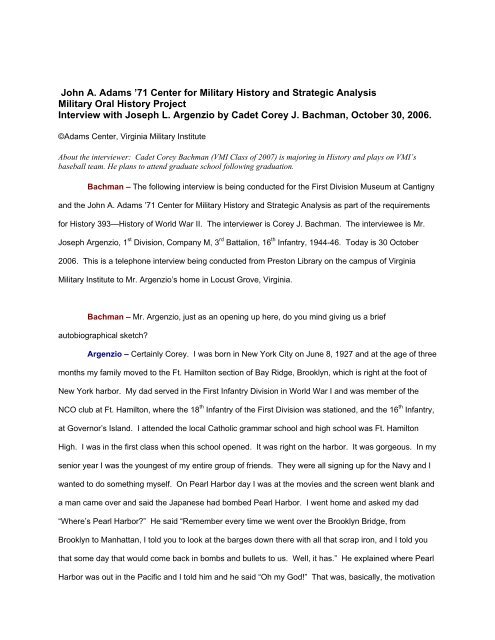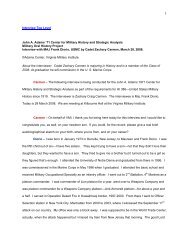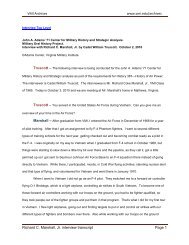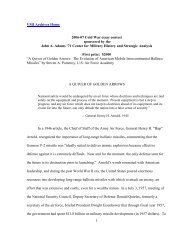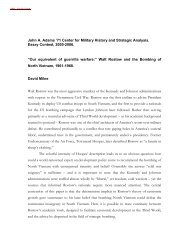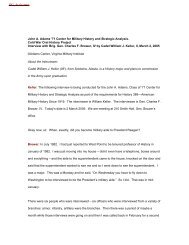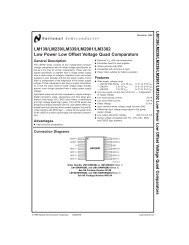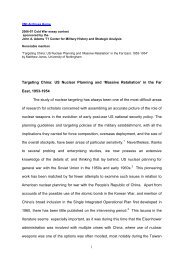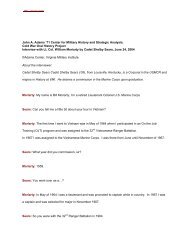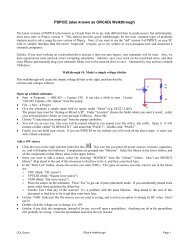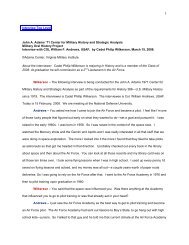Joseph Argenzio Interview Transcript. World War II Oral History. D ...
Joseph Argenzio Interview Transcript. World War II Oral History. D ...
Joseph Argenzio Interview Transcript. World War II Oral History. D ...
- No tags were found...
You also want an ePaper? Increase the reach of your titles
YUMPU automatically turns print PDFs into web optimized ePapers that Google loves.
John A. Adams ’71 Center for Military <strong>History</strong> and Strategic AnalysisMilitary <strong>Oral</strong> <strong>History</strong> Project<strong>Interview</strong> with <strong>Joseph</strong> L. <strong>Argenzio</strong> by Cadet Corey J. Bachman, October 30, 2006.©Adams Center, Virginia Military InstituteAbout the interviewer: Cadet Corey Bachman (VMI Class of 2007) is majoring in <strong>History</strong> and plays on VMI’sbaseball team. He plans to attend graduate school following graduation.Bachman – The following interview is being conducted for the First Division Museum at Cantignyand the John A. Adams ’71 Center for Military <strong>History</strong> and Strategic Analysis as part of the requirementsfor <strong>History</strong> 393—<strong>History</strong> of <strong>World</strong> <strong>War</strong> <strong>II</strong>. The interviewer is Corey J. Bachman. The interviewee is Mr.<strong>Joseph</strong> <strong>Argenzio</strong>, 1 st Division, Company M, 3 rd Battalion, 16 th Infantry, 1944-46. Today is 30 October2006. This is a telephone interview being conducted from Preston Library on the campus of VirginiaMilitary Institute to Mr. <strong>Argenzio</strong>’s home in Locust Grove, Virginia.Bachman – Mr. <strong>Argenzio</strong>, just as an opening up here, do you mind giving us a briefautobiographical sketch?<strong>Argenzio</strong> – Certainly Corey. I was born in New York City on June 8, 1927 and at the age of threemonths my family moved to the Ft. Hamilton section of Bay Ridge, Brooklyn, which is right at the foot ofNew York harbor. My dad served in the First Infantry Division in <strong>World</strong> <strong>War</strong> I and was member of theNCO club at Ft. Hamilton, where the 18 th Infantry of the First Division was stationed, and the 16 th Infantry,at Governor’s Island. I attended the local Catholic grammar school and high school was Ft. HamiltonHigh. I was in the first class when this school opened. It was right on the harbor. It was gorgeous. In mysenior year I was the youngest of my entire group of friends. They were all signing up for the Navy and Iwanted to do something myself. On Pearl Harbor day I was at the movies and the screen went blank anda man came over and said the Japanese had bombed Pearl Harbor. I went home and asked my dad“Where’s Pearl Harbor?” He said “Remember every time we went over the Brooklyn Bridge, fromBrooklyn to Manhattan, I told you to look at the barges down there with all that scrap iron, and I told youthat some day that would come back in bombs and bullets to us. Well, it has.” He explained where PearlHarbor was out in the Pacific and I told him and he said “Oh my God!” That was, basically, the motivation
2that we had, being youngsters in those days, for God and country because it had been instilled in us fromday of birth, I guess.He was very involved in the American Legion, the VFW, and the Society of the First Divisionwhere I attended many an event sponsored by the First Division with him. I met Teddy Roosevelt, Jr.,son of Teddy Roosevelt, ex-president, many times at these reunions. He was a friend of my father. Hebecame the deputy commander of the First Division when they landed in North Africa.From there I joined the service and I changed my birth certificate. We had ink eradicator—that’swhat they called it in those days—I changed the date to show that I was 17 and went down to join theMarine Corps. I didn’t do a very good job and they looked at it and threw me out. I went next door to theNavy and they did the same thing. I was determined. I was going to go. I changed my baptismalcertificate and went down to the draft board and said I was 18, which I had to be to go in the Army inthose days. They said “Are you serious? You’re 18?” I said “Oh yeah, definitely.” They said “Whenwould you like to leave?” I said “Well, tomorrow is fine.” They said “How about two weeks? You’ll betaking the place of a married man.” I said “Fine.” And that’s my introduction into getting into the service.Bachman – How old were you when you joined?<strong>Argenzio</strong> – That was the first week of January 1944, so I was not even seventeen. Two weekslater, almost to the day, I went with a large group of draftees to Grand Central Palace in New York City. Itwas an induction center. I took a physical, aptitude tests, etc., and from there we traveled by bus to Ft.Dix, New Jersey. My introduction to Army chow was a peanut butter sandwich and an orange—anoutstanding meal. As we used to say, nothing in the service is too good for our boys and that’s what wegot—nothing. Again, we took a lot of different tests there at Ft. Dix and I was told that I qualified for theintelligence service and that’s what I would be going into. After I received all my uniforms and things ofthat nature, and shots, etc. we were all gathered together in my barracks and marched out and put on atroop train. I said “Where are we going?” and they said “You’ll find out.”It took us five days for us to do that--the old Erie Railroad day coaches had black leather seats.I’ll never forget it. You could turn the seats around so you were facing one another and that’s where youwould sleep. You’d take the seats out, turn them around sideways and everybody would lay down—one,two, three, four. It was horrible. We went by Chicago and Cincinnati and if there was a freight train
3coming, we got put on a siding—it took about five days to get down there—Ft. McClellan, Alabama. Iwound up in the infantry. I said “Well, I’m suppose to go…..” and they said “Forget it. We need as manyinfantrymen as we can.” I never dreamed about why at the time. Everybody was going in the infantry orarmored. I was lucky enough—haha--to go to the infantry. It was an accelerated program. I didn’t get tofire many of the weapons. The only practice I had was with an M1 rifle, bazooka and a flame thrower. Icrawled down the infiltration course with the machine gun going over your head while you’re goingthrough the wire and things of that nature.I was very good. I was a captain in the Sons of the American Legion. In those days I played inthe drum and bugle corps and I was also in charge of the color guard and I knew the manual alarms andall that. They made me a squad leader with a black arm band and three stripes. I was a sergeant. Inever had to pull K.P. or guard duty. That was a plus. I became very friendly with the chef in our diningarea, as they called it—it was a mess hall—and I got pretty good food. Another thing, later on, there wasa sergeant in the regular Army. He had been up in the Aleutians, I believe and was stationed at Ft.McClellan. He said “Brooklyn”—my nickname—“I’m going to show you how to use a bayonet for attackand to defend yourself, because I need somebody to put on shows and show the troops how to handle it.”I did a couple of days working with him. We went from area to area and he would attack and I had todefend myself with a bayonet. The last part of that was I would bring my rifle up, hold it across my body,fall down on the ground and he’d come down with his bayonet and cut my strap. It was very goodtraining. I’d say it paid off later on.From there I was given a seven-day delayed route and I went home by train and saw the familyand then I had to report to Ft. Meade, Maryland. I was in Ft. Meade just a few days and then I was onanother troop train and went up to Miles Standish in Boston. That was kept as a secret for some reason.I don’t know why. We spent a couple of days up there and the next thing I know we’re on another trainand down to Boston harbor. We started up the gangway to a troop ship and it amazed me to find thatevery soldier going up that gangway was named “Yo” because they’d say “Jones, Yo.” Everybody was“Yo.” The West Point was the name of the ship then but the real name was the America. It was thesecond largest ship owned by the United States passenger line. It was the United States and then theAmerica. We went down in its hold and were told we would be 12 on and 12 off. You’d be down in the
4hold for 12 hours in your bunk and then you’d come up on the deck area and the other 12 guys would godown and they would dive into the bunks.The only time I ever volunteered for anything was when I volunteered to work in the mess hall onthe ship in the bakery. It was always rough seas going over but we were too fast for convoys andsubmarines so we zigzagged over. I survived not getting seasick by eating a lot of cake and bread. Ohthat was great. We were approaching our last day—I think it took us something like five days, to the bestof my recollection—Greenock, Scotland and I’m down in the hold and all of a sudden, KABOOM, and thatship just rolled. Everybody said “Oh, my God, we’ve been torpedoed.” I’ll never forget this younglieutenant who was in charge of our compartment, said “Don’t worry soldiers. The anchor chain got looseand hit the side of the ship.” I might have known that from a second lieutenant. What it was, we hadthese small British corvettes—very small escorts—which came out from Greenock, Scotland andGlasgow to bring us in and there was a sub out there, and they were throwing depth charges. They got acouple of them a little too close to us. They would really roll that big ship and I tell you, that was scary.We arrived at Greenock and we were met by the Salvation Army—God bless them—they gave usall kinds of goodies—donuts and coffee—and cigarettes, if you smoked cigarettes, which I didn’t at thetime. They put us on an overnighter train and we went down to southernEngland to a tent city. I was in this tent city for about three days and one day the sergeant comes in andhe calls out my name and I said “Here I am, Sarge.” He says “Get your gear together and follow me.” SoI got my gear together and went outside and he said “Get in that jeep.” I said “Well, where am I going?”He said “You’ll find out.” I got in the jeep and I said to the driver “Where are you taking me?” He had abig grin on his face and said “Hey, kid, you’re going to the big show.” I said “Wow, a show. Don’t tell meI’m going to see Bob Hope and Glenn Miller and all those Hollywood beautiful movie stars. Wow. Whatdid I do—win the lottery or something?” He said “Not exactly, you’re going on a cruise.” I said “A cruise?”He said “Oh yeah, a nice cruise on the English Channel.” Well the next thing you know he takes medown to the port and there was a lot of activity going on. My God, it was chaos. He said “Go up thatgangway to the Empire Anvil. Good luck, kid.” I went up this gangway and a bunch of G.I.s were hangingover the side of the railing yelling “Hey, kid, the Boy Scouts are down the street. Are you lost?” Theyreally gave me the business.
5I went up and got on the deck and this lieutenant comes up and says “Who are you?” I said “Sir,they told me to report here.” He said “Uh-oh.” So he brings me to this lieutenant colonel whose namewas Charles Horner. The colonel said to me “Who the hell are you?” I said “I was just told to report here.I’m a replacement.” He said “I didn’t order any replacements.” I said “Well, what should I do, sir? ShouldI go back to the pier?” Weymouth, England was where we were. He said “You’d like that, wouldn’t you?”I said “Well, I don’t know. I guess so.” He said “It’s too late now.” I said “Why?” He said “We’re sailing.”That was my escape route—I lost it. He said to the lieutenant “Find a place for him someplace. Thetroop compartments are all full. Find someplace for him and tell him to stay out of trouble.” That was theperiod between the 1 st of June and D-Day, which was the 6 th . I didn’t have a bunk and I wound up eatingwith the British crew. I’d go eat down in their galley in the ship and they loved fish and it was in thisgrease. You’d go down and you’d walk in and here’s this fish, floating back and forth, in the grease. Youtalk about being sick.I went to briefing and just stood on the side, listening. That’s where I found out I was with the 3 rdBattalion, 16 th Infantry of the First Division. I said “Oh my God! That’s the outfit my father served in in<strong>World</strong> <strong>War</strong> I.” Holy cow—what’s the odds of that? I said “Yeah, I know all about the 16 th , 18 th , 26 th .” Iwas told “Shut up kid, you don’t know what you’re talking about.” I was with the real soldiers from NorthAfrica and Sicily—what was left of them anyway.Came the morning of D-Day. We had breakfast at, I think, around 12:00 A.M. I finally got to eatone meal—my last meal—with some G.I.s. I went up on deck and all I had—they had given me two 30caliber ammunition cans and a carbine—and that’s all I had, plus my regular pack which wasn’t like the80 pound job that the rest of the fellows had. Mine must have weighed only about 30 or 35 pounds. Ididn’t train with them. I didn’t know what was going on, really. I went up and I’m standing up on the deckand the fellows are going overboard and then going down this cargo net—as they’re calling the groups.This British navy officer or NCO said to me “What are you doing, lad?” I said “Sir, I don’t know.” He said“Well, the war is not going to be waiting for you, you’d better get yourself over the side before somebodythrows you over.” I never practiced going down a cargo net like these fellows did. I started down and I’msaying Our Fathers and Hail Marys on the way down and I’m trying to see what happens as you go down.And there’s the landing craft that would come up and then it would go down—rise up and down with the
6waves. If you didn’t jump at the right time, when it came up, then it was a bigger fall, or you wentbetween the two ships. That happened to guys. They went right to the bottom. God was with me and Ijumped at the right time and this sergeant grabs me and says—here we got again—“Who the hell areyou?” I said, “I was told to come here.” He said “Get back in the boat.”That’s when everything started—there was supposed to be 35, I was number 36, I think, in theboat. I was just talking to the guys and we pulled away and we went to an area called Picadilly Circus. Itwas a marshalling area. We just kept going there for hours, around in circles, waiting for the call to go in.I remember saying to one of the old-timers “Oh boy, it’s great being with you vets.” He said “Lad, theminute they drop that ramp, you’re going to be a veteran.” Finally we got the call and we started in. Wewere the first wave. It was the 3 rd Battalion, I Company, L Company and M Company—in the middle—going in. We were passing these fellows floating in the water with these yellow jackets on. I thought“What the heck are they doing?” It turns out they were tankers—floatation devices that they put aroundtanks which didn’t work and the tank just went down deep six. A few got out but most of them just wentdown with the tank—the whole crew. The armor support we were supposed to have initially nevermaterialized. I think all but two went down.As we started in, the battleships and destroyers and cruisers opened up their guns and the AirForce was flying over with the airplanes—B-17s and B-25s—and everybody was saying with all this firepower going on, how could any Germans survive. This is going to be a piece of cake. What happened isthat the Air Force dropped their bombs inland and they killed a bunch of French civilians and cows. Ofcourse they said they were afraid to drop the bombs. They thought they might hit us. It was a real messupthere. The Navy overshot the beach too so, consequently, none of the artillery hit the beach. Whenwe went in you were naked and you went in at low tide. My boat hit obstacle they had to catch the boats,like railroad tracks and stuff like that, and we hit something and they dropped the ramp. The guys in frontgot killed right away because the Germans had it zeroed in with machine cross-fire with machine gunsand everything.Somebody said “Go over the side” so I went over the side and I went right to the bottom.Goodbye helmet, goodbye carbine, goodbye ammunition cans. If you saw the picture Saving PrivateRyan with the boys in the water, guys getting killed. That was my story, by the way. Only by the grace of
7God was I the only one in that squad—what happened, I came up and went down and came up and wentdown. I was starting to work my way in by bouncing up and down until I got to where I could stand. I hateto admit this but I have to tell the truth. I started to crouch down in the water that came up towards thebeach and there were dead bodies all around so I laid down and grabbed two of them which were right infront of me and I pushed them in and they were taking the fire that was meant for me. They were dead.They were mutilated but they saved my life. Finally I made it to a point where I figured I could run and Idid. I zigzagged, slipping on these wet stones and tripping and falling. There were guys getting hit allaround me and going down and screaming and yelling and yelling for medics. But, again, God was withme and I made it to this wall and that was the only place we had cover. That’s what made all thecasualties because we had no foxholes, nothing—no place to hide.You were naked going in. That happened on Omaha beach and alongside the First Division wasthe 29 th Division which was assigned to us because this was their first baptism of fire. They were aNational Guard outfit out of Virginia and Maryland and they came under our operational control until theirdeputy commander, General Cota, came in and took over. They took a beating, too. They’re the onesthat had the most casualties in one little town, Bedford, Virginia.Bachman – We went there my freshman year, actually.<strong>Argenzio</strong> – People don’t realize but the 29 th was assigned to the First because the First was theoutfit that invaded North Africa, essentially. It was the most experienced outfit and General Patton said,when he thought he was going to command the Normandy Invasion, “I’m not taking that job unless I canget those SOBs from the First.” Only he didn’t just use SOBs. It was something. I just laid against thiswall and guys came flopping in by you and the next thing I know a guy says to me “Here, have acigarette.” I don’t smoke. But he sticks this cigarette in my mouth, he lights it and I inhaled and almostchoked to death. Oh my God, that was awful.Then we saw these guys laying out there in front of us and I looked at this guy and he looked atme and I said “We’ve got to do something. Come on.” So the two of us crawled out and started pullingguys in. We didn’t know if they were dead or alive—we just started pulling them in. How we didn’t get hit,God, I’ll never know. There was the smell of cordite going on and screams and everything—it washorrible. I finally got to where I couldn’t even breathe any more. This signal officer came crawling down
8the beach and he said “I want your names and serial numbers.” I said “Why?” He said “Don’t ask why.Just give me your names and serial numbers.” So we did and then he said “I’m putting you in for a majordecoration.” I looked at the kid and he looked at me. So the officer crawled on down the beach to the leftof us and he wasn’t more than 30 yards down and we were hit by mortars and he got almost a direct hit.That was the end of the decoration. I would have given anything to have him alive—heck with thedecoration, you know.The next thing you know another officer came by and he said “Hey, you guys, where are yourweapons?” I said “Well mine are out in the water, sir.” He said “Go get yourself a weapon and a helmet.”So I crawled out again and I got a weapon I had to strip a guy of his weapon and got an M-1 rifle, acartridge belt, etc. and I crawled back with all this stuff—grenades and things—and I put the helmet on.This guy had a size nine head. I put it on and the helmet came down over my nose. I looked likeSadsack, so I adjusted the helmet liner. He said “We need some guys. We’re going to blow the wire andwe’re going to go up this draw.” We blew the wire and it was about 15 or 16 of us, I guess, and we gotthrough the wire. There was a lot of grass that was burning and we got through that and through somewater and started up the draw. There were mortar shells, plus anti-personnel mines. Guys were steppingon mines and getting killed going up this draw.I got about three-quarters of the way up, I think, and was about the third or fourth in line by thistime and there were machine gun pits right to my right—German machine gun pits—and they werepeppering the beach. They didn’t see us they were so busy shooting. So I started throwing grenadesand I got two of those son-of-a-guns. I took my M-1 and used a clip and they took off. I wanted to makesure they were gone. We got to the top and we stopped to get our breath and one guy reached in and hetakes out this little flag and he holds it up and he says “Thank God we made it.” And he’s waving this littleflag. That was the Army’s ceremony that the Marines had on Iwo Jima, only we didn’t have anybodytaking our picture.Then we organized two groups. One was a small group of about eight or nine of us and we wentleft and a larger group went to the right, led by a captain and this Lieutenant Monteith. We fought our wayto this little hamlet called La Grand Hameau and we took the hamlet. We were there only about an hourand the Germans counter-attacked and they got us out of there. We would have been dead if we’d tried
9to stay in there. We went back, reorganized and retook the hamlet later on in the day. Some of the guysthat went to the right with Lieutenant Monteith wound up getting the Congressional Medal of Honor—orthe Medal of Honor as they call it today. We stayed in that little town there all night and in the morning Iwas leaning out this window, protecting this roadway, and two officers came in. One of them was alieutenant colonel and the other one was a captain. The colonel walks by me, looks down and says“Soldier, you smell. When’s the last time you took a bath.” I said “Sir, I don’t remember.” And the captainputs his hand on my shoulder and said “Oh, I’m sorry son. Take care of yourself.” And he walked away.My uniform was purple from blood in the water and then pulling these guys in. So I didn’t smell too goodat all.I stayed with this group for three days. It was a mixture of guys from all different companies. Wewere slightly disorganized at that point. Finally somebody said to me “Who are you with?” I said “I don’tknow. They didn’t tell me what company I was assigned to.” “What company were you on the boat with?”I said “Somebody said something about L company.” So they directed me to where the battalion had setup their little CP and I checked in there and they said “Oh yeah, we know about you. You’re assigned toBritish section, M Company heavy machine gun.” I said “O.K.” and they told me where they were and Iworked my way toward them. By this time we were at the hedgerow, fighting, and when I got there, therewas this captain, the company commander. I went up to him and he said to me “What happened to you?We didn’t know if you were AWOL or whether you got killed.” I told him what happened and he said “Oh,I heard about you. O.K.” He scared me—I thought I was in trouble—as it turned out I wasn’t. “We knowwhat you did two days ago, on the beach.” It was my Bronze Star award for actions on the beach.We were in the hedgerow fighting and that lasted day after day after day and we took an awfulbeating because we couldn’t get through those things. The Germans had them all zeroed in and if youstuck your head through that hedgerow you got your head blown off. That hedgerow fighting was tough.Finally in July—skipping ahead—we were around St. Lo and that’s where the Air Force dropped bombson a field headquarters. A three-star general was the highest general killed during the war in Europe—General McNair—and he came over for an inspection and he happened to be there when they droppedthe bombs and he got killed with a couple hundred men.
10After that, Corey, it was just fighting through France into Luxembourg, Aachen—which was abloody battle. Then we hit the Battle of the Bulge where, in all honesty, I was frozen. By this time—byattrition--I’m a platoon sergeant and here I am, just turned 17. We were getting recruits every day—replacements—and I used to laugh. They’d come up and say “Hey kid, where’s Sergeant Brooklyn?” andI’d say “You’re looking at him.” And they’d go “Whoa! O.K., sorry Sarge.” These soldiers were 30 yearsold, for crying out loud. It was really horrendous. It was cold. The snow finally got heavy.We took this farm house and two things happened. We wanted to get into the basement to see ifwe could get some food. Of course, hot food—or any kind of food at that point—they could never reallyget it to you. I took the 45 out that I had and I was going to shoot the lock off, and I pulled the trigger andthe bullet hit the lock and fell to the floor. That’s how old the ammunition was. I’ll never forget that. Thatwas a joke. In fact, I had that bullet for a long time until somebody walked away with it. I found a largesled and that’s how we managed to get that heavy 30 caliber machine gun—the water-cooled—and thetripods and everything loaded up. We stole the sled from this Belgian farmer and that’s how we wereable to get through with all this heavy equipment. That’s one of the things I confiscated.The Battle of the Bulge—oh God—it was November and December in the Huertgen Forest. I’msure you know about the Huertgen Forest. You were penned down. That was the biggest disaster. Wenever should have been in there. Every division that was involved in that took an awful beating. We werepenned in there for days. You couldn’t get out of your hole. It was horrible. I’ll never forget during theBulge—John McCarthy was my company commander. He was a private when he hit North Africa andwhen I met him and took over, he was a captain. He wrote the book on mortars. He was some piece ofwork. The dirtiest looking soldier you ever saw in your life, but what an officer. He became myGodfather. [end of Side A] [start of Side B]Bachman – Would you like to continue?<strong>Argenzio</strong> – Yes, sure. After the Battle of the Bulge and all these other major battles that we wereinvolved in, we finally hit the Rhine and the first time we got a decent rest. We were waiting to get ordersto cross the Rhine. Now, we didn’t go over the Remagan Bridge. We were about an eighth of a miledown from Remagan Bridge. The engineers put up a pontoon bridge and that’s what we crossed. The3 rd Armored Division went over Remagan Bridge and we came up to support them and that’s where
11General Maurice Rose—youngest general in the Army—got killed. He was out on recon and ran into atank and got shot. The 3 rd Armored took an awful beating, right across the Rhine. They had four tanksand a platoon or a squad and three had the turrets blown off—what a beating they took. They came upagainst the Tigers and Panthers of the Germans. Our tanks didn’t have a chance. We just worked ourway through.I had been wounded back in France—shrapnel and concussion—and then I got hit again just overthe Rhine—almost identical. I still carry a lot of shrapnel in the backs of my legs to this day. It was sosmall that it didn’t pay to take it out. In fact, they said “It will come out by itself—don’t worry about it.”Worry?Finally we hit the Harz Mountains and that was tough fighting, up and down the mountains. Onthe morning of the 7 th of May—let me back up one second. We were in this one town in the HarzMountains and I had set my guys up in this house and up in the attic window, facing this road, I had oneof the machine guns sets up there. I went up to see the kid that was on guard duty, and all of a sudden,here comes—I couldn’t believe it—three German tanks. They came down this road and stopped right infront of this house. Oh my God, we’re dead! This kid says “Hey, I can button them up.” I said “I’m goingto button you up.” They spotted us up in the attic window and here comes this 88 that was on the thirdtank back and it starts coming up and the muzzle got bigger and bigger and bigger. That looked like thebiggest gun we ever saw and I said “We’re getting the blankity-blank out of here.” We went diving downthe stairs and they took the top of the roof off. And with that, they took off. They went around the buildingand into a field and left. It was crazy.It was no more than about 40 minutes later, they came back to the exact same spot. But this timewe were waiting for them and we had these tank destroyers and we were waiting and when these guyscame back, the TDs hit them in the side where they were vulnerable. They were bailing out and theywere S.S. guys and we were picking them off left and right and that was the end of them. Beautiful tanks.But I’ll tell you, how stupid could you be? The size of that muzzle being lifted up and I’m looking right at it.But, getting back to the 7 th of May. We jumped off and said we’re going to take this place calledFalkenau and it turned out that it was a death camp. In the movie “The Big Red One” they showed thetaking of Falkenau, and Sam Fuller who was the producer of many, many movies—“The Big Red One”
12and many others—I was with him. He was a sergeant in I company, and got to know him and he filmedwhat happened after we took the camp. It was man’s inhumanity to man. The ovens—the bodies piledup eight high, etc. It was really horrible. The next day, the war ended. The company commander of Icompany said “O.K., give me some men” and I gave him some men, and some of his own, and theyrounded up the local populace and he said “Clean out your places with what clothes you can bring” andbrought them to the camp and made the people dress the dead as much as they could. Then we had afuneral and a funeral procession and their local cemetery—and this was all taken by Sam Fuller with hislittle camera—and I have a copy of that. It was something. The archives of the First Division, I’m sure,have a copy of it with the actual procession and dressing the dead.From there we had to turn the camp over to the Russians we met down there. We didn’t getalong with them--they didn’t like us and we didn’t like them. We went on to an area near Falkenau inCzechoslovakia and that’s where there were these big fields and they were bringing all these displacedpersons into these fields and separating them in areas by country. If you were Polish, if you wereLithuanian, if you were Italian—thousands of them—and the orders came down that they would bringtrucks in and put these people on trucks and take them to a railhead and send them back to theircountries. Well, these people were all trying to get away from the Russians and they kept comingtowards us. The orders were they could only take one suitcase or one parcel. A lot of them had two orthree bags with them but the orders were only one, and that’s all. What happened were the guys had totake the bags and only let them get on with one and people were screaming and yelling. That waspathetic. It was their possessions. By the end we had mountains of baggage, so some of the guys said“Hey, I wonder what’s in those things?” I said “You’re never going to find out. Go get some jerry cansand we’re going to burn it.” And that’s what I did. I burned it. I thought I’d never be able to sleep againfor the rest of my life.Then we went to Bamberg, Germany which became regimental headquarters for the 16 th Infantryand I got orders to report to regimental headquarters. They found out I had been in the drum and buglecorps and all that stuff and they were forming the 16 th Infantry band, drum and bugle corps. I wasassigned to that. Within two weeks we had the units playing. A bunch of the guys were professionalmusicians and they were good. We had a 27 piece dance band. Oh, man, they were terrific. As I said,
13they were all professional musicians. The first parade was in Nuremburg for a big review in a stadiumwhere Hitler used to get up and make speeches to thousands of German soldiers. It was Eisenhower,Bradley, our division commander, Patton, and a couple of other generals—they were all up on thereviewing stand. That was something to see them up there. I stayed in Hamburg—which was excellentduty—that was terrific. We were well taken care of. We stayed there for about nine months and I wasgetting ready to come home and I said “No, I don’t want to go home” so I extended. You could extend for30 days, 90 days.We went from there to Landshut, Germany, which had big buildings, which was an S.S. trainingcenter for their armored divisions and we took that over. I stayed there until around the 1 st of July 1946.My mother had gotten hold of this general she worked for and said “I want my son home.” He got hold ofmy general, and I was sent home. They wanted me to stay in because, by that time, they didn’t have anycombat experienced guys left. He said “Do you want to go for a commission? You want to be firstsergeant?” I said “Yeah, I’ll stay.” “No, you’re going home.” I got home the end of July 1946. I pulledinto New York harbor and my mother and father met the ship. I had sunglasses on and if your parentswere there to meet you they let you off the ship first ahead of the bulk of them. I came down the gangwayand my mother is yelling “He’s blind, he’s blind. I knew it.” I said “Mom, I’m not blind. I just have a pair ofcheap sunglasses on.”From there they took us all to Ft. Dix and gave us a two-day pass. That was the worst thing theycould have done because the guys went into Manhattan and we tried to drink Manhattan dry and partiedfor two days, and then went back to Ft. Dix and I was discharged. I was home and they had a thingcalled the 52-20 Club in those days. Until you got a job, you could get $20 a week from the government,for 52 weeks and you had go to down and sign a statement saying “I’m looking for a job.” I got twochecks and my father said to me one morning, “<strong>Joseph</strong>, we don’t have any bums in this family. Go get ajob.” I said “I’ve been away three years.” “Go-get-a-job!”I heard that the Brooklyn Army Terminal, which was close by where we lived, was hiring so I wentdown there and got a job as a clerk. A real nothing job. We had to bring the war dead home. Theystarted up the American graves division. I was asked if I would like to be a checker—checking casketswhen they came in off the ships—and make sure the manifest checked with the name on the container of
14the casket. I said “Yes,” and we had tremendous warehouse areas. The buildings were so long theyextended six blocks. We would process the remains—caskets—and then ship them out to where theywere going, with Army guards taking them for burial.I always looked for the First Division—I’d look on the container—and I spotted this one, Callahan,that I was in basic training with. I said, “Hey, he was in my squad. He got killed by friendly fire comingback from night patrol and a trigger-happy replacement killed him.” That was in April and the war wasover in May. I knew the funeral parlor, which was up in Manhattan near Broadway, and I went over there.There was just an elderly gentleman sitting there. I identified myself and said I was with John. He said“He died a hero.” I said “He certainly did.” Then he started out raking on me. “How come you’re herewhen he’s in that box?” I left. I’ll never forget that.I think that’s the toughest part. I think about those poor guys over in Iraq. When you’re put incharge of a squad or platoon and you’re an officer and you start losing people—that stays with youforever. It gets you, but there’s nothing you can do about it.I stayed in that job for about 18 months and was asked if I’d like to learn transportation. I said“Oh, sure.” So I went to this commercial travel office and learned all about railroads and airlines andsteamships and that became my future. As I went on through the years I became chief of militarypassenger operations--DOD. I think there were shipping divisions, dependents, replacements fromEurope, military units—all kinds of major things—Operation Gyrascope—flip-flopping divisions, one goingover and one coming back. Onward transportation when the Hungarian Freedom Fighters were broughtover here. We took care of them. When the Stockholm and the Andrea Doria liners collided off CapeCod, we brought many of the survivors into our pier and we had to take care of them. So we wereshipping people all over the world.The last big thing was the moving of the 1 st Cavalry Division to Vietnam—Ft. Benning. I don’tknow if you saw the movie “We Were Soldiers Once—and Young”—it was a book and then a movie.Bachman – I saw it.<strong>Argenzio</strong> – I lived with those guys down at Benning, organizing this whole move and we movedthem to Vietnam from Charleston and Savannah. All of their equipment went out of Mayport, Florida.They had this one lieutenant colonel who was a real hard-charger and his troops went out and stole a
15white mule. They presented it to him in a formal ceremony. I was in at CP with General Kinnard, thegeneral in charge of the CAV division, and we were having a meeting and this colonel walked in and said“Sir, I hope you made reservations to ship my mule.” He said “No, George, I’ve been trying. We can’t dothat.” “He said “We’ll see about that, sir. I’ll go to the top.” The next day I get a call from McNamara, whowas the Secretary of Defense, and he said “You will find some way to get that mule across.” This guywas politically gung-ho. He knew the right people. I found out that we used these old <strong>World</strong> <strong>War</strong> <strong>II</strong>aircraft carriers for all our helicopters and trucks and everything, and there was an old Army muleskinnerwho was a chief in the Navy. So we shipped the mule down there. Well, months later this Navycaptain—my counterpart—comes in and he’s roaring laughing. I said “What the heck is so funny?” Hesaid “You’ve got to read this telex.” I picked it up and it said “Stockton lost his ass. Please replace.” Iinitially heard that the mule just died with the climate but the true story that came out later was that themule, at night, used to roam the perimeter, walking around, and this one night this young trooper—it wascrazy over there in Nam—yelled “Stop or I’ll shoot. What is the password?” and he didn’t get an answerso he shot and killed the mule. They said “Why did you shoot?” and he said “He didn’t know thepassword.” That may sound stupid but that’s a true story.I left that job. I was offered the job as chief of transportation for the U.S. Department of State andI accepted that and had an office up in New York, right at the <strong>World</strong> Trade Center, and I stayed in thereand did a lot of world-wide traveling, overseas, and around the world, making sure of logistics, makingsure that everything was O.K. I finally retired May 30 th , 1984 and became a regular on the golf course.When I was working I was very active in the volunteer fire service up on Long Island, New York. I was afire officer, a fire commissioner—very active up there—and here at the lake. They got me involved assoon as I moved down here to Virginia and I’m the president of the Fire and Rescue here at the lake. Itkeeps you busy. That’s my story. Do you have any questions?Bachman – Would it be O.K. if I went back a little bit?<strong>Argenzio</strong> – Yes.Bachman – Before you crossed the Channel, basically you didn’t really have any training forwhat you were about to do, correct?
16<strong>Argenzio</strong> – The First Division, when they finished up in Sicily, went up and started re-trainingagain for the invasion with the 29 th which, as I said, was assigned to them. The 29 th ’s General Gerhardt,who was the commanding general, his motto was to tell the troops “Let’s go.” They’d always start with“Let’s go.” and they used to run. That’s the story I was getting from my guys later on. And the FirstDivision guys had been in combat for so long would say, “Go ahead, we’re right behind you. Go ahead.Have fun.” They practiced over there in England. They ran drill, after drill, after drill for the pre-invasion.I missed all of that. I had no concept of what they were going to do. As I said, I had what they call onthe-jobtraining.Bachman – When was the first time that you got a chance to relax after those first couple of daysthere?<strong>Argenzio</strong> – In the infantry, Corey, you never really relax. Even if they pull you back, and maybeonce in a blue moon they’d pull you off the line of the unit and go back to the showers or something, butas far as relax—you’ll see in the movies a lot of these guys having big card games, laughing anddrinking—but I didn’t have too much of that. I’ll be honest with you. We were too uptight to really, reallyrelax. I wish I could give you a better answer.Bachman – That’s fine. What were your opinions in all aspects, basically, about the enemysoldiers when you were going over to Europe?<strong>Argenzio</strong> – Being indoctrinated, watching the movies before I went in the service, of theseGerman soldiers—they were really something else. Then listening to the stories on the troopship of theG.I.s who had fought in North Africa and Sicily. There were two types. There was the regular soldiers.They were a lot of draftees, etc. As it turned out, most of the troops that we fought at Normandy were notGermans. They were Russians and Poles, etc. There was quite a mix of people who, to get away fromthe Russians, had joined the German army. Then you had the S.S. and they were heartless, cruel and itmade us heartless and cruel too, because we knew, when we went up against them, it was take noprisoners. The young soldiers, which used to make me laugh, was the Hitler-Jugend. They were 14through 17 and they were tough. These young kids were so well indoctrinated that they were toughfighters.Bachman – Would you say that you, at least, respected their fighting ability?
17<strong>Argenzio</strong> – Oh, definitely, yes. They were tough. They had better weapons than we did. Thebest weapon we had was the M1 rifle. They had machine pistols, they had the burp guns, their rifles werebolt action. As I said, we had better rifles, but everything else they had was much better equipment—more modern. Their German artillery—the German 88—everybody knew about an 88. That was just awoof-bang. To this day I can still hear that sound—of an 88. It was devastating. Our tanks only had 75son them and the 88s just blew them to pieces. They would take our tanks apart. In my opinion, for everyrifle they had, we had 20. We beat them that way.Bachman – Did you have any frustrations with the equipment that you were issued later on inEurope or any malfunctions? Basically, what were your opinions of the weapons that you were issued?<strong>Argenzio</strong> – As I said, the M1 rifle—even officers, if they had any sense, carried a M-1 rifle. Thatwas a great weapon—semi-automatic weapon. The machine guns that we had—a water-cooled 30caliber—were from <strong>World</strong> <strong>War</strong> I. A German machine gun would go WOOMPH and we’d go bup-bup-bup.I’d say our weapons were adequate. I wouldn’t say they were great, except for the M1. That was great.Bachman – What type of relationships did you build with your comrades? I guess close ones, Iwould assume, but after the war and stuff like that? Did you keep in touch with a lot of them?<strong>Argenzio</strong> – It was funny. During the Battle of the Bulge, I told you about the bayonet training. Itpaid off during the Battle of the Bulge. The Germans overran an outpost and they were on us before weknew what happened and I emptied my M1 rifle and I looked down and there was one left and he came atme with a rifle and bayonet and I beat him to it. I took him down and I had to kill him. When it was over, Iwas shaking like a leaf. I went over and had previously relieved this crew to go get some chow and bringit back to me and one guy on machine gun duty. I went over and this kid is sitting there crying and I said“What’s wrong with you? Why didn’t you help me? You almost got me killed.” He said “I can’t help it. Ican’t take it.” Well, I got rid of him. I sent him back to company and they sent him back to some rearechelon outfit. I was in my office in Germany after the war and in walks this guy. He says “Rememberme, Sarge?” I said “Yeah, you look familiar.” He told me who he was and he said “I just want to shakeyour hand and thank you for saving my life.” He said “I couldn’t take it. I would have turned to suicide.”But as far as when we got home—I didn’t make too many friends during combat. It was something you
18didn’t do. But during the band, yeah, I did stay in contact with several of them. Meet a couple of them atthe First Division reunion and stuff like that.Bachman – You mentioned that you didn’t make many friends during combat. Was that becausepeople were afraid to lose their friends if they made good friends?<strong>Argenzio</strong> – That’s certainly correct. You didn’t want to get too friendly. Of course, right away,they wanted to tell you about their girlfriends, their wives, their mother and father and it was better youdidn’t hear all this. As much as you wanted to really get in and mix with them, I always tried to stay aloof.I was fair, but I was honest. It was my way of doing things. I’d crack jokes with them every once in awhile, but no, I didn’t because I knew I was going to lose them or they’d lose me. We must have turnedover 20 times.Bachman – You mentioned that you had requested an extension but what was your overallfeeling when you knew you were going to return home?<strong>Argenzio</strong> – Mixed emotions. I was really enjoying peacetime in Germany. I was having a ball—areally good time. But then, I kept saying to myself, “I guess it is time” but I didn’t push it to come home,which I could have. I had enough points. You had to build up points and then come home. Finally, as Isaid, my mother blew the whistle on me and then I couldn’t wait to get home.Bachman – Mr. <strong>Argenzio</strong>, that’s basically all the questions I have. We’re only a few minutesaway from the end of the 90 minute tape anyway, so I guess this would be the best point to end it, if that’salright with you.<strong>Argenzio</strong> – It certainly is, Corey. I just want to thank you for the interest that you and the schoolwould take the time to hear my story. I wish we could get our story out to young people to realize thatfreedom isn’t free. You’ve got to pay the price for it.Bachman – Absolutely.<strong>Argenzio</strong> – I’m really honored that you took the time to listen to my story.


